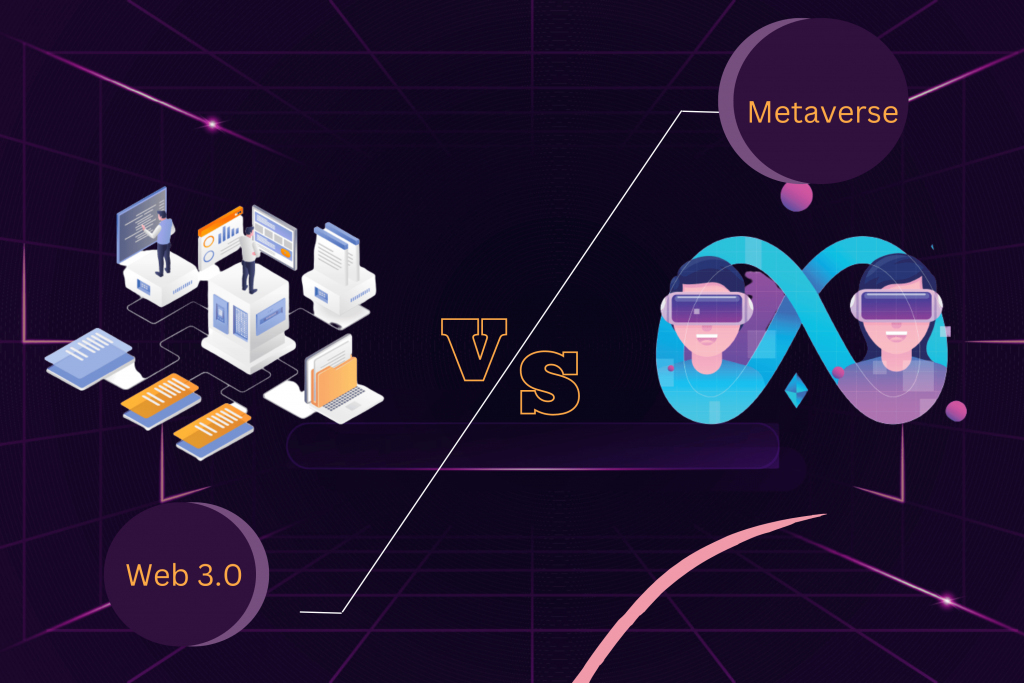
Web3.0 vs Metaverse : Exploring Digital Futures
The potential for multiple metaverses has been a topic of discussion in the Web3 community. While blockchain and cryptocurrency technologies are intertwined, there are significant differences between them.
The internet and associated technologies are constantly changing. However, as new technology advances, it brings with it a variety of complexities and scenarios for users.
The internet was introduced many years ago, but privacy concerns continue to be a major source of debate and controversy. Similarly, web3 and the metaverse exhibit the same phenomenon in terms of their use and identity. Both are gaining popularity and recognition in the business and technology worlds.
Hashtags come and go, but some stick around for a while. Web 3.0 and the metaverse are two relatively new terms that are frequently used interchangeably. However, they are two distinct technologies.
The word metaverse whispers something foreign and futuristic. It is a web of 3D virtual worlds that incorporates real-life elements.
Metaverse is a way of social interaction in contrast to the methods we have available today. It combines AR, VR, video, and blockchain to set up virtual worlds where humans can coexist, be it in the form of avatars, digital figures, etc.
Augmented reality (AR) superimposes computer-generated images on top of real-world surroundings, typically using a mobile device. It connects virtual and real environments, and incorporates olfactory, visual, and auditory senses.
Virtual reality (VR) creates a simulated environment that is entirely different from the real world. Video games are one example of such a simulation. VR provides a realistic experience in a virtual setting and makes even the impossible seem possible.
What Is Web 3.0?
Also known as Web3, Web 3.0 is aimed at decentralizing the internet. That is how this tech is slated to put the power of content creation completely in the hands of creators. Moreover, this technology will eliminate the concept of having a few platform owners.
Even now, the internet is not technically owned by anyone. But the fact is that a few technology majors exert an incredible amount of influence on the internet. And that is what Web 3.0 will thwart once it is widely adopted. In simple words, Web 3.0 uses the concept of decentralization to democratize the internet. This piece of technology is giving control to the users of the internet.
Web 3.0 comprises a range of components, including semantic web, AI, 3D graphics, high-speed connectivity, spatial web, blockchain, and crypto money. Web 3.0 uses different and sophisticated decentralized protocols to democratize data ownership. Because of democratizing data ownership, Web 3.0 hopes to address some key shortcomings that are commonplace in today’s digital landscape.
Moreover, Web 3.0, in its fully realized state, will be completely decentralized. Being decentralized means that the users will step into a permissionless ecosystem. That means Web 3.0 throttles internet providers’ capability to levy terms and conditions to use the web.
What Is A Metaverse?
In 2021, Facebook changed its name to Meta. However, Facebook is not an end-to-end metaverse yet—it is on the road to building a unified metaverse, though. That means Facebook is a participant of a metaverse. A metaverse is a collective virtual space that is vendor-independent and device-agnostic. This space is virtually enhanced to help metaverse users create a brand-new digital reality.
Moreover, metaverses can even have their dedicated virtual economies. These economies are driven by digital currencies and unique non-fungible tokens or NFTs. Thanks to metaverses, entertainment, medical, and event companies can embark on the journey toward delivering immersive and connected experiences.
The best part is that a well-built metaverse will not want its users or participants to bring their infrastructures. Instead, a metaverse will offer a robust framework to help businesses host their virtual events. That way, metaverse events provide a brand with an opportunity to bring its integrated offerings. On the other hand, retail players entering a metaverse means creating and delivering engaging shopping experiences. That means a metaverse is like Web3’s spatial web. The only thing is that a metaverse will be more inclined toward creating and delivering superior experiences powered by 3D graphics, real-world imaging, etc. That means a metaverse will help a user walk through the internet and touch the elements present on the web.
Web3 vs Metaverse
Methodologies
Web 3.0 is all about data ownership and how information can be transmitted with minimal human interference.
Metaverse, on the other hand, is focused on developing a conceptualized experience that incorporates various virtual and real-world elements.
Technologies used
Web 3.0 is made up of blockchain technology and users who are connected through decentralized peer-to-peer networks. This allows for open, permissionless access to anybody with an internet connection.
Metaverse is a bit different in that it relies on various components to work together, including virtual and augmented reality, blockchain, and interactive interfaces. In order to create a working metaverse, a whole ecosystem must be planned and put into action.
Stakeholders
Web 3.0 is all about giving users complete control over the web. That means no more major players or stakeholders dictating what users can do or how they can use the web.
Metaverse, on the other hand, has commercial involvement. That means individual companies can create and control virtual worlds and the experiences associated with them.
Purpose
Web 3.0 is all about giving users a way to interact with the network in a decentralized, trusted, and permissionless manner.
Metaverse, on the other hand, is a virtual world that uses 3-D elements to create innovative experiences in entertainment, virtual reality, gaming, and health.
We hope you’ve enjoyed our article on Web3.0 vs Metaverse. We’re excited to see how this technology will continue to evolve and how we can help you make the most of it. If you have any further questions or concerns, please contact us at any time at www.philomathresearch.com. We look forward to hearing from you!